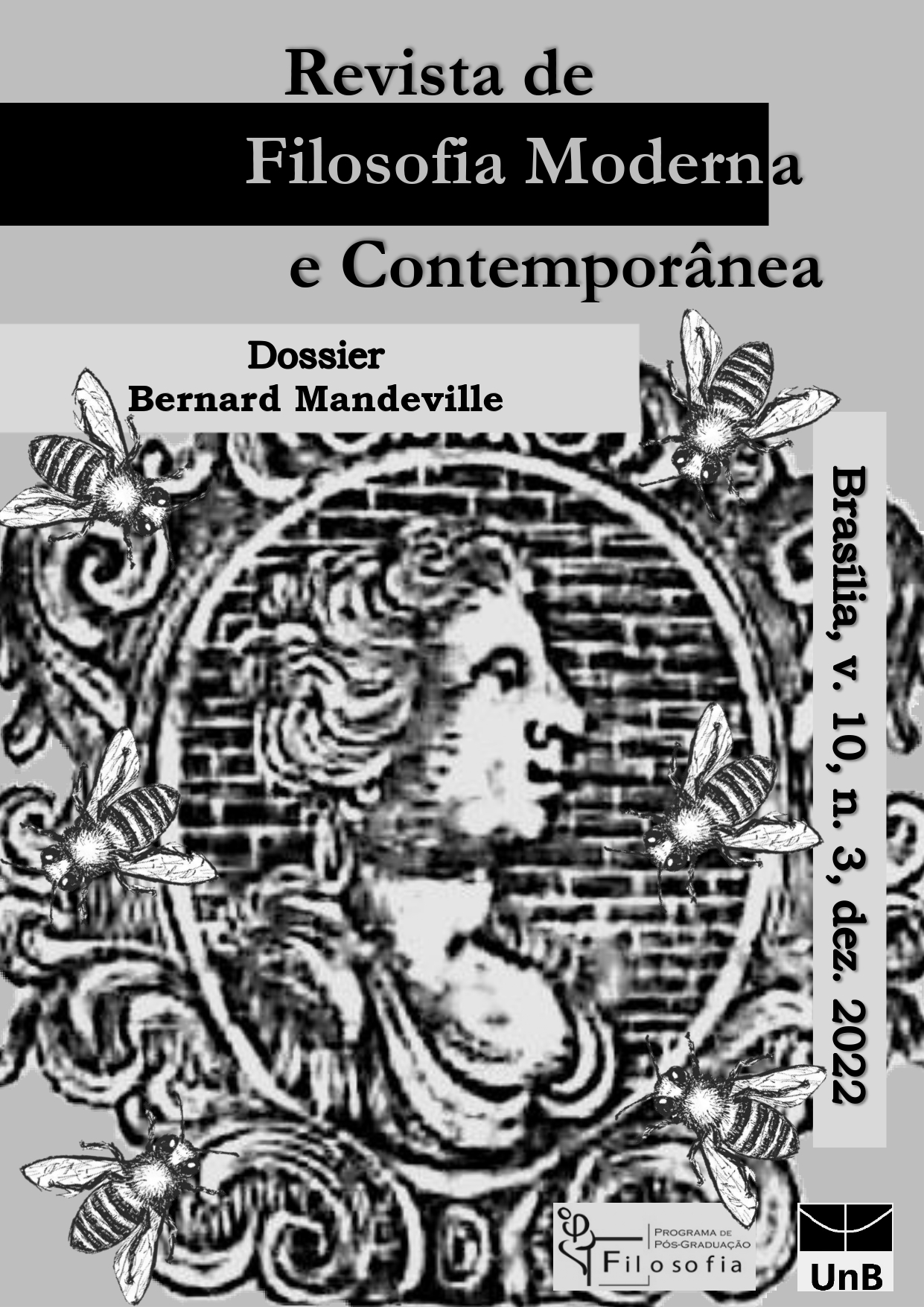Bernard Mandeville: Wealth beyond Vice and Virtue
DOI:
https://doi.org/10.26512/rfmc.v10i3.49607Parole chiave:
Bernard Mandeville. Wealth. Virtue. Commercial society.Abstract
Bernard Mandeville denounced the moral philosophy of his times, its theoretical and practical dimensions, as elitist and contrary to human nature. The explanations and recommendations derived from this moral philosophy, according to Mandeville, was inadequate to understand and govern commercial society. Mandeville scrutinized existing explanations about human nature, confronted them with what he presented as facts and unraveled their contradictions. This leads to Mandeville’s challenge: accepting things as they are or assuming the responsibility of transformation. This is the challenge I aim at exploring in this paper. We can continue to live in a highly unequal society based upon pride and shame or we can create incentives that will lead to a different calculation of passions in line with a Utilitarian criterion.
Riferimenti bibliografici
CHALK, A.F. “Mandeville’s Fable of the Bees: A Reappraisal” in Southern Economic Journal, 33:1, pp.1-16, reprinted in M. Blaug (ed.) Preclassical Economists, Volume III, John Law (1671-1729) and Bernard Mandeville (1670-1733), Aldershot: Edward Elgar Publishing, 1991 [1966], pp.149-164.
BERKOVSKI, S. “Mandeville on self-liking, morality, and hypocrisy”, Intellectual History Review, 32:1, 2022, pp.157-178.
DANG, A-T. “Technological Change and Economic Dynamics from the Scottish Enlightenment to Contemporary Evolutionary Economics”, Journal of the History of Economic Thought, 38:2, 2016, pp.211-228.
DOUGLASS, R. “Bernard Mandeville on the Use and Abuse of Hypocrisy”, Political Studies, 70:2, 2022, pp.465-482.
————— “The dark side of recognition: Bernard Mandeville and the morality of pride”, British Journal for the History of Philosophy, Ahead-of-Print, 2021, pp.1-17.
FACCARELLO, G. “Les fondements de l’économie politique libérale: Pierre de Boisguilbert”, in A. Béraud et G. Faccarello (dirs), Nouvelle histoire de la pensée économique. Volume 1: Des scolastiques aux classiques. Paris: La Découverte, 1992, pp. 154-175.
HORNE, T. A. The Social Thought of Bernard Mandeville. Virtue and Commerce in Early Eighteenth Century England. New York: Columbia University Press, 1978.
HURTADO, J. “‘Vicios privados, beneficios públicos’ o la diestra administración de un legislador utilitarista” Lecturas de Economía, 61, 2004a, pp.70-98.
———— La philosophie économique de Jean-Jacques Rousseau, Adam Smith et Jeremy Bentham à la lumière de Bernard Mandeville, Thèse pour obtenir le grade de Docteur en Sciences économiques, sous la direction de M. le Professeur Arnaud Berthoud, Université Paris X Nanterre, 2004b.
LALLEMENT, J. “Économie politique et morale: l’héritage de Mandeville” in: Économies et Sociétés, Série OEconomie, Histoire de la pensée économique, 18:12, 1993, pp.11-31.
LUBAN, D. “Bernard Mandeville as moralist and materialist”, History of European Ideas, 41, 2015, pp.831-57.
MANDEVILLE, B. The Fable of the Bees or Private Vices, Publick Benefits, 2 vols. With a Commentary Critical, Historical, and Explanatory by F.B. Kaye, Indianapolis: Liberty Fund. Available at: http://oll.libertyfund.org/titles/1863. 1988.
MAXWELL, J. C. “Ethics and Politics in Mandeville”, in: Philosophy, XXVI: 98, 1951, pp.242-252.
PENDERGAST, R. “Knowledge, innovation and emulation in the evolutionary thought of Bernard Mandeville”, Cambridge Journal of Economics, 38:1, 2014, pp.87-107.
PICCHIO, A. “Needs and Passions of Human Subsistence in the Moral Economy of the Early 18th Century: Defoe and Mandeville”, in: History of Economic Ideas, XI:2, 2003, pp. 7-29.
SCOTT-TAGGART, M. J. “Mandeville: Cynic or Fool?”, Philosophical Quarterly, 16:64, 1966, pp. 221-231.
SMITH, A. An Inquiry into the Nature and Causes of the Wealth of Nations, R.H. Campbell & A.S. Skinner general editors, Indianapolis: Liberty Fund, 1976 [1776].
STEINER, P. “Marchands et princes. Les auteurs dites ‘mercantilistes’” In. A. Béraud and G. Faccarello (dirs.) Nouvelle histoire de la pensée économique. Des scolastiques aux classiques. Tome I. Paris: Éditions La Découverte, 1992, pp.95-140.
SUSATO, R. “An ‘Ingenious Moralist’: Bernard Mandeville as a Precursor of Bentham”, Utilitas, 32:3, 2020, pp.335-349.
TOLONEN, M. Mandeville and Hume: Anatomists of Civil Society. University of Oxford, Voltaire Foundation, 2013.
VERBURG, R. “The Dutch background of Bernard Mandeville’s thought: escaping the Procrustean bed of neo-Augustinianism”, Erasmus Journal for Philosophy and Economics, 9:1, 2016, pp.32-61.
Viner, J. (1991). “Introduction to Bernard Mandeville A Letter to Dion (1723)” in D.A. Irwin (ed.), Jacob Viner. Essays on the Intellectual History of Economics. Princeton: Princeton University Press, pp.176-188.
Dowloads
Pubblicato
Fascicolo
Sezione
Licenza
Copyright (c) 2022 Journal of Modern and Contemporary Philosophy

Questo volume è pubblicato con la licenza Creative Commons Attribuzione - Non commerciale - Non opere derivate 4.0 Internazionale.
Direitos Autorais para artigos publicados nesta revista são do autor, com direitos da primeira publicação para a revista. Em virtude dos artigos aparecerem nesta revista de acesso público, os artigos são de uso gratuito, com atribuições próprias, em aplicações educacionais e não-comerciais.


